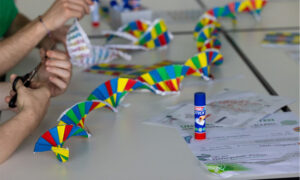
Read the latest Issue
Ahead of the EMBL/EMBO Science and Society Conference, neuroscientist Craig Stark urges us to think differently about memory

A common belief is that memory is like a tape recorder: imprints of our experiences that are stored and accessed on demand. But if you believe that, try watching this video.
While scientists can explain in considerable detail why we remember and forget, far less is known about why we sometimes recall things not quite as they happened – something that can be quite a surprise when played back to us on screen. Craig Stark, a cognitive neuroscientist at the University of California (UCI), wants to learn more about this peculiarity. “We’ve known that memory is imperfect for a long time,” he explains. “But understanding why is incredibly difficult. We struggle to find ways to ‘see’ a memory – one could even argue that we never have really achieved this.”
Nevertheless, a growing body of knowledge is pointing to the many ways that memories can change over time. “Memory is a reconstructive process, susceptible to distortion and loss,” Stark explains. “There are clear mechanisms that we can observe at the molecular level where memories change, can be erased, or even implanted. Most of the time our memories serve us well, however the difference between our perceptions of a remembered event and the reality can cause big problems in crucial situations, such as eye-witness testimony.
“This is not abnormal,” Stark continues. “Our brains are designed to have false memories. With so many stimuli around they record the gist of what is new and fill in the rest with previous knowledge. From an evolutionary perspective, generalising from similar events helps us. But it also makes our memories vulnerable.”
Our brains are designed to have false memories
Studies led by Stark’s team have shown that at times where we expect our minds to be at their sharpest – such as recalling violent or other stressful events – distortions can occur. “Even minor distortions can have severe consequences,” he explains. “Your recollection of events can be skewed by your prior attitudes, expectations and experiences. For example, one classic study in the field showed that when people read a brief text about a wild and unruly girl, they are much more likely to mistakenly remember the text stating that the character was deaf and blind if told the person was named Helen Keller (the name of a famous deaf-blind author) than if they were named Carol Harris – when in reality the text did not mention this at all. People unwittingly added information and filled gaps based on assumptions that the text referred to ‘that’ Helen Keller. Another study indicated that changing the way that you ask questions – such as using the word “smash” rather than “hit” – can influence people’s memories about the severity of an event.”
False memories have even been observed in amnesiacs. “In 1953, a famous patient called Henry Molaison – known as H.M. – underwent an operation that removed crucial brain structures: from that day on he was unable to remember what happened even minutes ago,” says Stark. “In many ways he was trapped in the 1950s. In an interview in the 1990s, he was asked if he knew who the president of the United States was. He didn’t, yet when asked if the president was a man or a woman he was certain it was a man. What were the odds of having a female president in the 1950s? His brain tricked him with a best guess.”
There are clear implications for the legal system
The onus then is on promoting a greater awareness of memory processes in daily life. “As an expert in false memories, I realise I could just be filling in my assertions on why I think this is so based on my expectations!” Stark smiles. “But in seriousness, there are clear implications for the legal system: jurors for example are expected to watch weeks’ or months’ worth of evidence and then recall it in order to make decisions. In such instances, it is crucial to recognise that memory is open to distortion, it is the natural way our system works and it happens in all of us.”
Craig Stark will speak at the EMBL/EMBO Science and Society conference: The Past in the Present – The Making of Memories, which will take place at the EMBL Advanced Training Centre, 3–4 November.
Looking for past print editions of EMBLetc.? Browse our archive, going back 20 years.
EMBLetc. archive